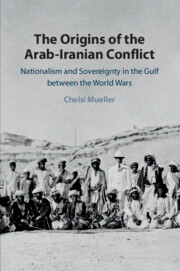 The Origins of the Arab-Iranian Conflict
The Origins of the Arab-Iranian Conflict Published online by Cambridge University Press: 24 July 2020
The geopolitical rivalry between the Gulf Arab states and Iran has its origins in the interwar period, the period between the Paris Peace Conference in 1919, which marked the end of the First World War, until 1941 when the Persian Gulf became a theater of the Second World War. The interwar period was a formative period because it marked a transition from a Gulf society characterized by symbiosis and interdependency to a subregion characterized by national divisions, sectarian suspicions, rivalries, and political tension. The introduction of Iranian nationalism to the Persian Gulf waterway, islands, and littoral and the unprecedented interventions of the British government in the Arab shaykhdoms including Kuwait, Qatar, Bahrain, Dubai, Abu Dhabi, Sharjah, and Ras al-Khaimah, constituted a watershed in the history of the Persian Gulf, disrupted centuries of unrestricted movement, refashioned frameworks of exchange between the two shores, and forged an acute Arab-Iranian dichotomy that would characterize the Persian Gulf into the twenty-first century.
To save this book to your Kindle, first ensure no-reply@cambridge.org is added to your Approved Personal Document E-mail List under your Personal Document Settings on the Manage Your Content and Devices page of your Amazon account. Then enter the ‘name’ part of your Kindle email address below. Find out more about saving to your Kindle.
Note you can select to save to either the @free.kindle.com or @kindle.com variations. ‘@free.kindle.com’ emails are free but can only be saved to your device when it is connected to wi-fi. ‘@kindle.com’ emails can be delivered even when you are not connected to wi-fi, but note that service fees apply.
Find out more about the Kindle Personal Document Service.
To save content items to your account, please confirm that you agree to abide by our usage policies. If this is the first time you use this feature, you will be asked to authorise Cambridge Core to connect with your account. Find out more about saving content to Dropbox.
To save content items to your account, please confirm that you agree to abide by our usage policies. If this is the first time you use this feature, you will be asked to authorise Cambridge Core to connect with your account. Find out more about saving content to Google Drive.